theartsdesk in Göttingen: Handel goes east | reviews, news & interviews
theartsdesk in Göttingen: Handel goes east
theartsdesk in Göttingen: Handel goes east
Three concerts to remember and an underpar opera in one of Germany's greenest and loveliest towns

Let me confess: I had to return to lovely Göttingen as much for the frogs as for the Handel. Puffing out their throats like bubblegum, the amphibians' brekekekek chorus in the ponds of the great university’s botanic gardens actually made a more spectacular showing, in my books, than the main opera of this year’s Handel Festival, the 93rd, with its canny theme linking the German honorary Englishman with the Orient.
Take the myth of German efficiency with a pinch of salt. My entry in to the usually enchanted world of one of the country’s most civilized and easy-going towns proved more than usually fraught. The plane took half an hour to coast to its port at Frankfurt Airport – known here as Franz-Kafka Airport ever since a two hour nightmare trying to replace an onward boarding pass left on the plane after a 5am arrival from Chennai – and even with hand luggage only I took another half-hour to get to the airport railway station. The train was delayed by forty minutes outside Kassel, and though I’d never given myself much chance of arriving for the beginning of Joseph and his Brethren in Göttingen’s Stadthalle, this was too much. Tearing past the gabled handsomeness of the old town streets, I only just made the beginning of the second half.
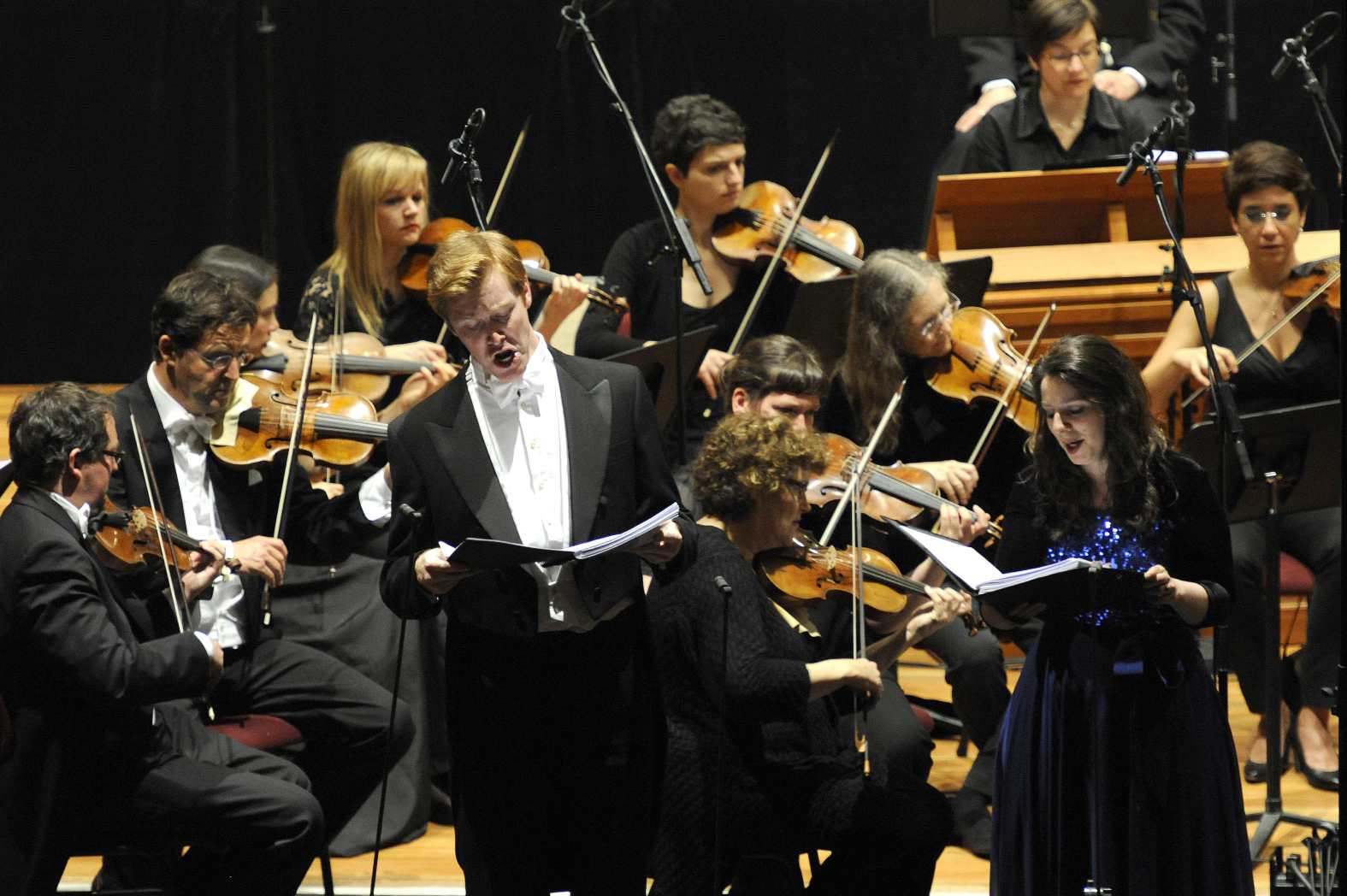 Was it worth it? Absolutely. What a team Cummings had assembled for this curiously proportioned work of fitful genius. The extended choral wonders include a chromatic fugal lament and a "Hallelujah!" style finale, all delivered with professional verve by the North German Radio Choir. Joseph as Pharaoh’s troubled right hand man was handsomely characterized with as much dramatic charge as the part allows by Tim Mead (pictured above with Elizabeth Watts), one of several countertenors who seem to have developed more strength and authority over the years.
Was it worth it? Absolutely. What a team Cummings had assembled for this curiously proportioned work of fitful genius. The extended choral wonders include a chromatic fugal lament and a "Hallelujah!" style finale, all delivered with professional verve by the North German Radio Choir. Joseph as Pharaoh’s troubled right hand man was handsomely characterized with as much dramatic charge as the part allows by Tim Mead (pictured above with Elizabeth Watts), one of several countertenors who seem to have developed more strength and authority over the years.
Consort Asenath is a non-part, dramatically speaking, but musically bejewelled. Despite a bit of losing the way early on in Part Two, Elizabeth Watts rose to a dazzling coloratura challenge that raised the roof and made it a hat trick, for me, after her ineffable Bach and Poulenc earlier this spring. There was well-defined support, too, from contralto Hilary Summers, clarion Munich tenor Robert Sellier and bass George Humphreys. The local treble singing the crucial role of young Benjamin rather lowered the temperatures, though he accurately delivered the notes. Cummings has stayed true to the forces of the Göttingen Festival Orchestra, as bequeathed to him by Nicholas McGegan, as well he might; the two Italian double-bass players still underpin a rock-solid line and bags of personality. The hall may be 70s-airport-style ugly from the outside but the auditorium and the acoustics are a wonderful asset for a small town.
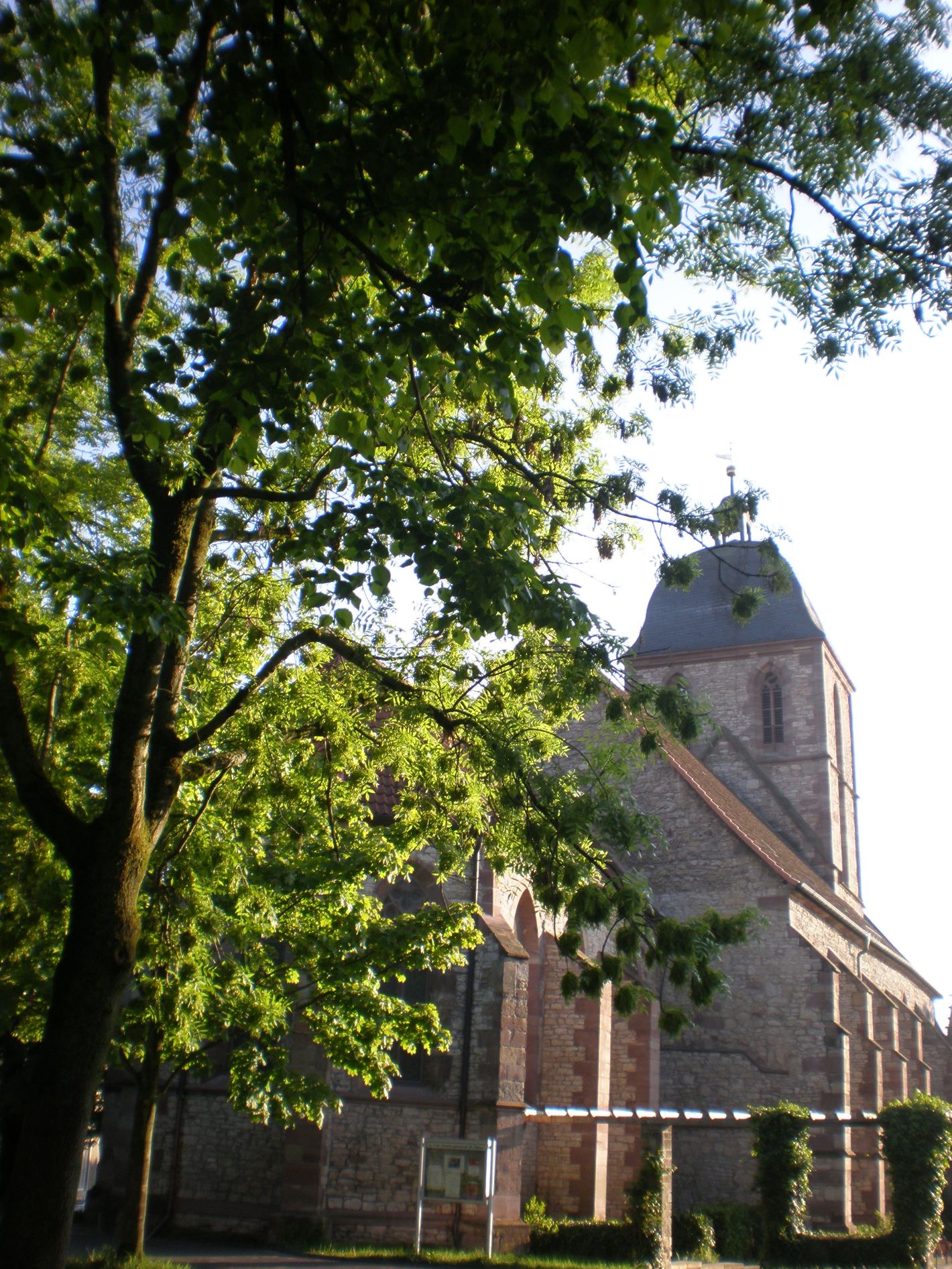 German timekeeping remained awry that Friday night. Joseph overran the advertised schedule by forty minutes, and the mandolin recital over the road in the Albanikirche (pictured left) had already been rolling for ten minutes by the time we dashed across in a storm. But the winged altarpiece by Hans von Geismar had to be seen – St Alban’s was the only Göttingen church I didn’t manage to get into on the last visit – and Avi Avital was, as promised, a phenomenon. His programme ranged from a transcription of Bloch’s Nigun, his own tumultuously brilliant Kedma and a recent bit of mood music by Yasuo Kuwahara to the Chaconne from Bach’s Second Partita – yes, every note.
German timekeeping remained awry that Friday night. Joseph overran the advertised schedule by forty minutes, and the mandolin recital over the road in the Albanikirche (pictured left) had already been rolling for ten minutes by the time we dashed across in a storm. But the winged altarpiece by Hans von Geismar had to be seen – St Alban’s was the only Göttingen church I didn’t manage to get into on the last visit – and Avi Avital was, as promised, a phenomenon. His programme ranged from a transcription of Bloch’s Nigun, his own tumultuously brilliant Kedma and a recent bit of mood music by Yasuo Kuwahara to the Chaconne from Bach’s Second Partita – yes, every note.
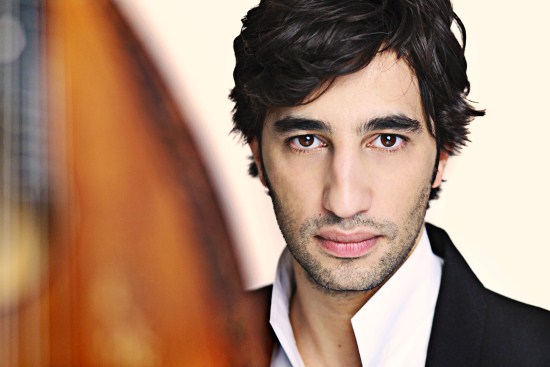 All this on an instrument which can capture, at least in Avital’s hands (the mandolinist pictured right), all the nuances from the near-inaudible to the near-symphonic. The folk encore, followed by “Lascia ch’io pianga” from Handel's Rinaldo in duet with theorboist Anders Ericson from the Ensemble NAYA in which Avital often plays, was breathtaking; a packed and agewise very mixed audience rose to its feet. Unfortunately the thunderstorm which had challenged the quieter meditations was still in full spate. At well past midnight – another, this time very welcome overrun – there were no taxis going westwards from outside the Stadthalle, so I walked twenty minutes in torrential rain until my shoes were quagmires, and collapsed into the InterCity Hotel at a quarter to one.
All this on an instrument which can capture, at least in Avital’s hands (the mandolinist pictured right), all the nuances from the near-inaudible to the near-symphonic. The folk encore, followed by “Lascia ch’io pianga” from Handel's Rinaldo in duet with theorboist Anders Ericson from the Ensemble NAYA in which Avital often plays, was breathtaking; a packed and agewise very mixed audience rose to its feet. Unfortunately the thunderstorm which had challenged the quieter meditations was still in full spate. At well past midnight – another, this time very welcome overrun – there were no taxis going westwards from outside the Stadthalle, so I walked twenty minutes in torrential rain until my shoes were quagmires, and collapsed into the InterCity Hotel at a quarter to one.
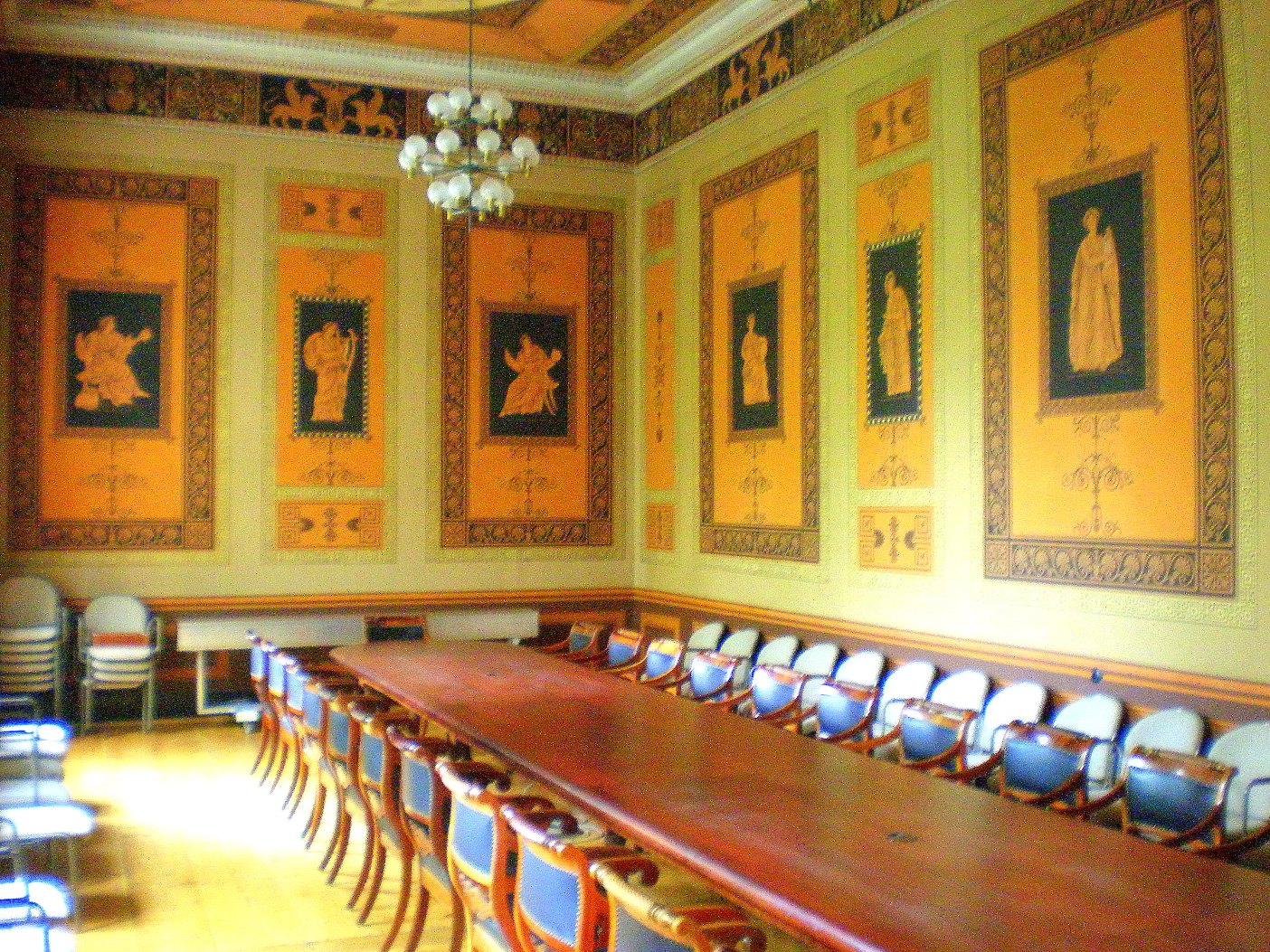 Saturday and Sunday offered much more the serene experience I associate with Göttingen. The following morning I met Victoria Viebahn, the town’s English doyenne, at the 1837 Aula of the University, in the lovely central square overlooked by benefactor William IV, and had the tour I’d long wanted of the Great Hall with its wall of kings – Lawrence’s George IV among them – and the Akademiesaal with its Grecian frieze of Apollo and the nine muses (pictured above). For nearly three centuries, a classical education has always been valued above the religious in Göttingen.
Saturday and Sunday offered much more the serene experience I associate with Göttingen. The following morning I met Victoria Viebahn, the town’s English doyenne, at the 1837 Aula of the University, in the lovely central square overlooked by benefactor William IV, and had the tour I’d long wanted of the Great Hall with its wall of kings – Lawrence’s George IV among them – and the Akademiesaal with its Grecian frieze of Apollo and the nine muses (pictured above). For nearly three centuries, a classical education has always been valued above the religious in Göttingen.
I should have caught a late-night recital in the Aula, but the main concert experience of the evening proved too overwhelming to follow. It should have been a gala for soprano Sandrine Piau. But a few days earlier she’d called off sick. Cummings knew the right replacement, and fortunately she was available: our own, ever more dazzling Lucy Crowe. She kept to her advertised part of the programme, and even added a third of the Cleopatra arias from Handel’s Alexander Balus.
This plaintive Egyptian, not to be confused with the more famous namesake from Giulio Cesare who dominated the second half, has some ravishing numbers. “Hark! Hark! He strikes the golden lyre” is Handel’s most exotic eastern tribute, decked out with mandolin – its only appearance, Avital had told us, in any of the master’s oratorios or operas – and harp. “Convey me to some peaceful shore” breaks off in grief that can no longer be uttered. The restraint was admirable, but the real heights were hit in the last two more famous Cleopatra arias. “Se pieta di non mi senti” seared the soul with every conceivable tone colour; the coloratura of “Da tempeste il legno infranto” was effortlessly dispatched not as display but as an expression of sheer vivacious delight. It had to be encored, of course, and seemed just as light and easy second time around. If there is more perfect Handel singing than this, I’ve never heard it.
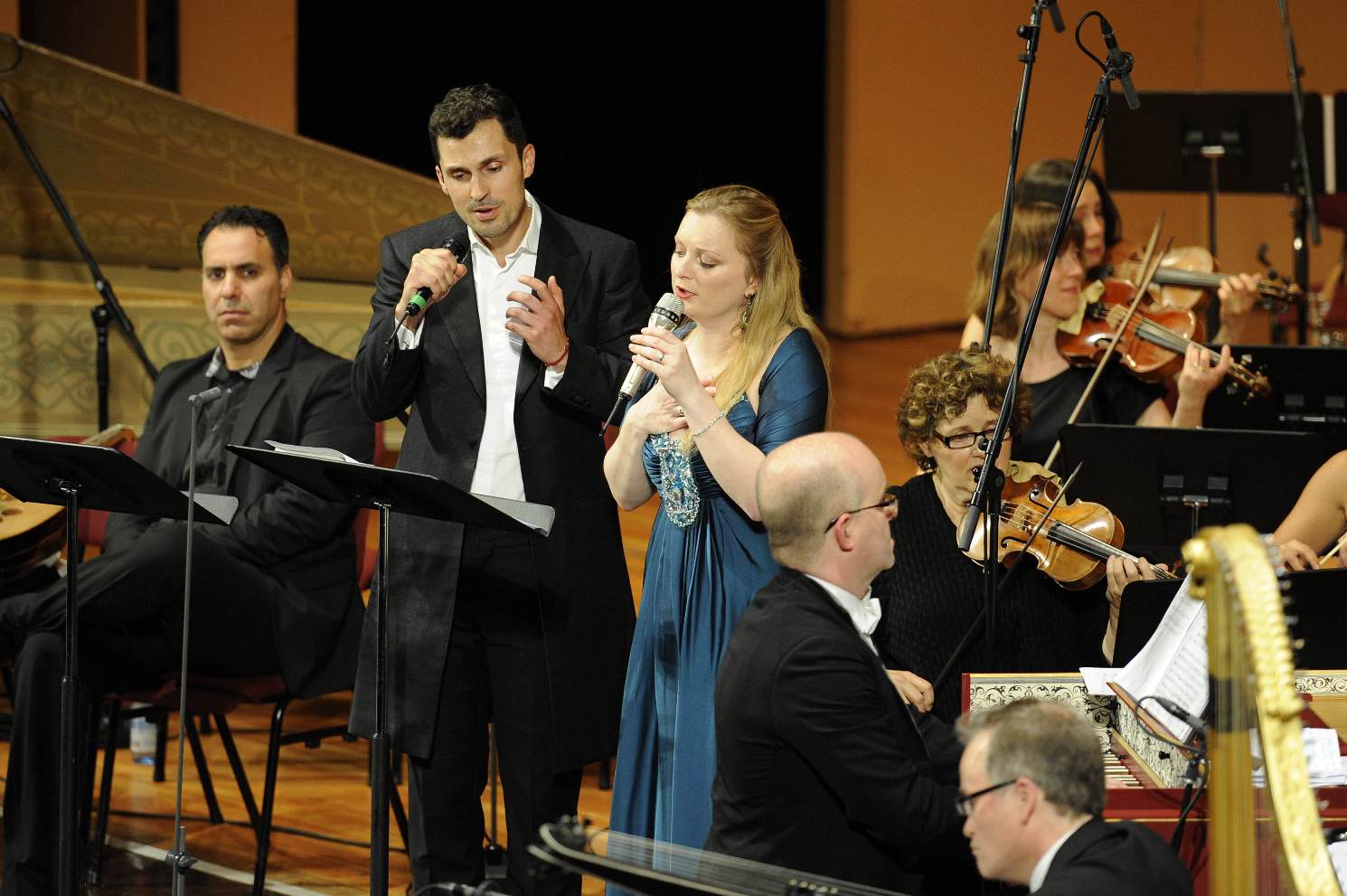 The second, but not subordinate, band in the evening more than held its own against Crowe and the superlative Göttingen orchestra, who also dazzled us with Johann Joseph Fux's Turcaria, a wildly exotic commemoration of the 1683 Siege of Vienna complete with fugal battle. Six players of the Ensemble NAYA – including Cummings wreaking magic in a harpsichord introduction, oud-player Yair Daral and sitarist Yotam Haimovich – supported stylish countertenor Yaniv d’Or, excelling in the Moorish inflections of a ravishing lullaby. He joined Crowe at the end (pictured above) for a classic which has really come into focus in this town in 2013 (Anne Sofie von Otter had sung it two nights earlier): Barbara’s chanson “Göttingen”, a bouquet from a Frenchwoman to a German town she adored. A great plea for European unity, and stunningly delivered into a microphone by Crowe in an unfaltering chest voice: who knew she could? It was a surprise conclusion to one of the best-planned concert programmes I've ever encountered, no callow fusion effort and respectful of its various musics; so much for a showy gala, and all congratulations to Cummings for threading it all together.
The second, but not subordinate, band in the evening more than held its own against Crowe and the superlative Göttingen orchestra, who also dazzled us with Johann Joseph Fux's Turcaria, a wildly exotic commemoration of the 1683 Siege of Vienna complete with fugal battle. Six players of the Ensemble NAYA – including Cummings wreaking magic in a harpsichord introduction, oud-player Yair Daral and sitarist Yotam Haimovich – supported stylish countertenor Yaniv d’Or, excelling in the Moorish inflections of a ravishing lullaby. He joined Crowe at the end (pictured above) for a classic which has really come into focus in this town in 2013 (Anne Sofie von Otter had sung it two nights earlier): Barbara’s chanson “Göttingen”, a bouquet from a Frenchwoman to a German town she adored. A great plea for European unity, and stunningly delivered into a microphone by Crowe in an unfaltering chest voice: who knew she could? It was a surprise conclusion to one of the best-planned concert programmes I've ever encountered, no callow fusion effort and respectful of its various musics; so much for a showy gala, and all congratulations to Cummings for threading it all together.
Watch Barbara performing "Göttingen" in 1967
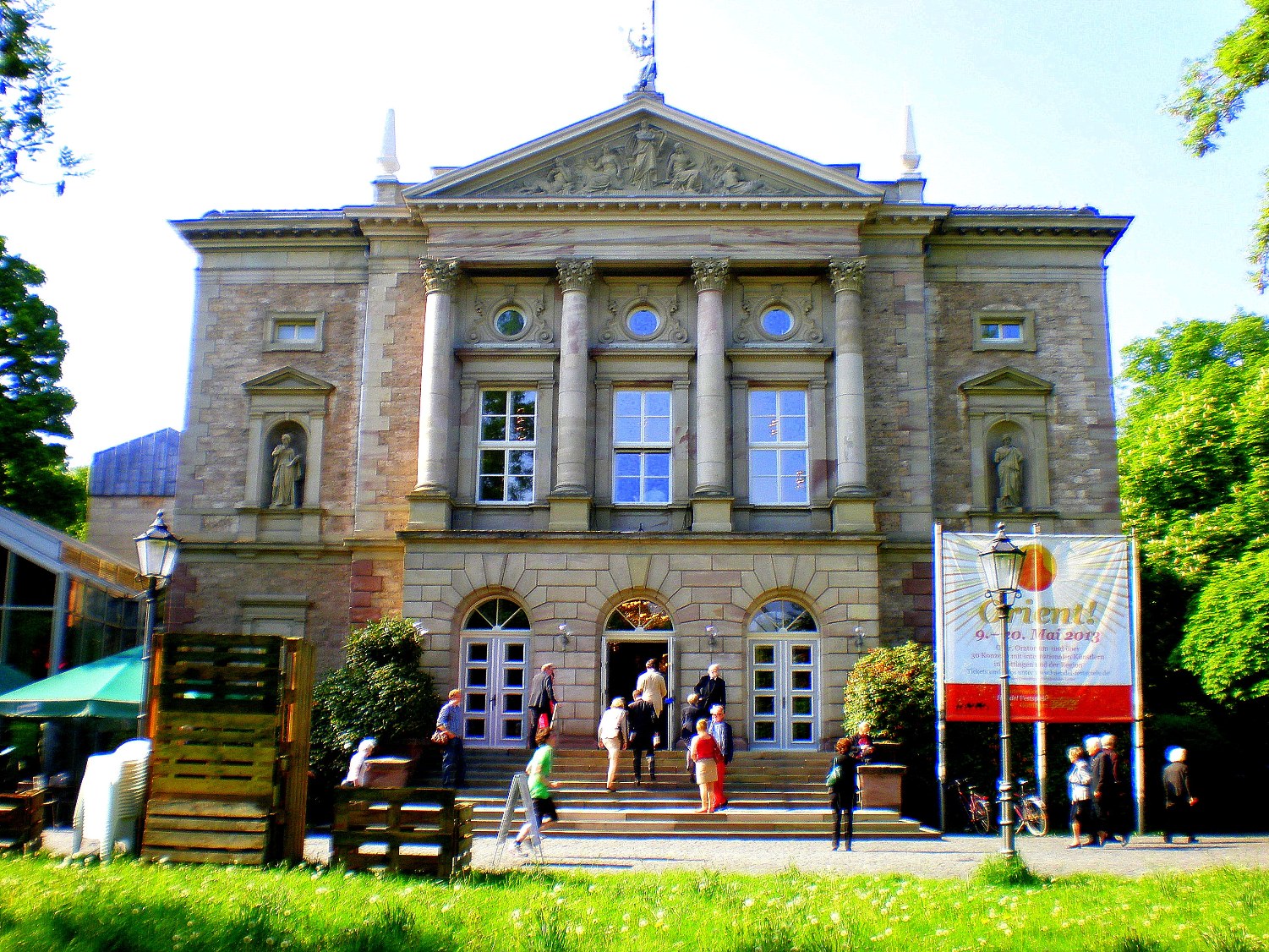 Sunday was the blue-sky, balmy day I associated with Göttingen from my last, unclouded visit. So after a tour of the magnificently graffitied student "prison" in the Aula, I took myself off to the Botanic Gardens to catch the frogs and enjoy a lunch in the Café Botanik, where Iranian owner Manoucher Amin is still serving up the perfect plate of mirsa ghasemie. There was much more of the Orient about this than anything in Handel’s hastily-pasted extravaganza to a popular text by Metastasio, Siroe, Re di Persia over at the Deutsches Theater (pictured above) that afternoon.
Sunday was the blue-sky, balmy day I associated with Göttingen from my last, unclouded visit. So after a tour of the magnificently graffitied student "prison" in the Aula, I took myself off to the Botanic Gardens to catch the frogs and enjoy a lunch in the Café Botanik, where Iranian owner Manoucher Amin is still serving up the perfect plate of mirsa ghasemie. There was much more of the Orient about this than anything in Handel’s hastily-pasted extravaganza to a popular text by Metastasio, Siroe, Re di Persia over at the Deutsches Theater (pictured above) that afternoon.
Director Immo Karaman, brilliantly abetted by the revolving sets of Timo Dentler and the multiple costume changes required by Okarina Peter, had set this family farrago of a Lear-like father, good and bad sons and two rival queens in a decaying mansion where DJs and evening dress are the opening order of the day. So meaningless is the relationship of plot to music that it could just as easily have been played as an elegant comedy, but Karaman went for extended angst, giving the singers physical modes of being to back up their displays but at too overworked a length.
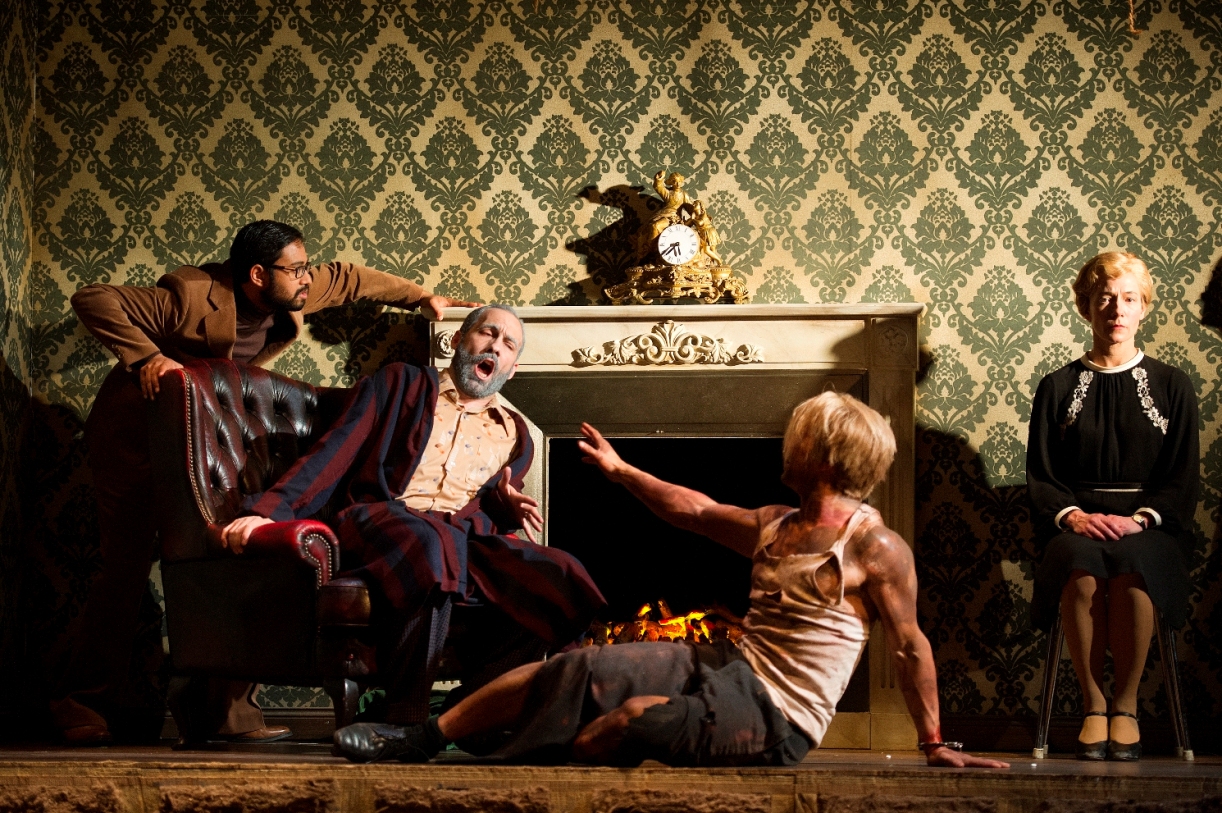 Ultimately, the production neither detracted from nor added to the fairly unworkable drama – except in the riveting personage of dancer Bettina Frische (pictured on the right with Ross Ramgobin, Lisandro Abadie and Yosemeh Adjei), who in Fabian Posca’s careful choreography begins and ends the show as a slightly Mrs Danversish servant, dispensing tea and impassiveness until things start to go wrong. The curtain was a triumph: the family is left to its bickering, and Frische’s "voice of the people" takes herself off for a quiet cuppa in the next room.
Ultimately, the production neither detracted from nor added to the fairly unworkable drama – except in the riveting personage of dancer Bettina Frische (pictured on the right with Ross Ramgobin, Lisandro Abadie and Yosemeh Adjei), who in Fabian Posca’s careful choreography begins and ends the show as a slightly Mrs Danversish servant, dispensing tea and impassiveness until things start to go wrong. The curtain was a triumph: the family is left to its bickering, and Frische’s "voice of the people" takes herself off for a quiet cuppa in the next room.
No-one else could quite live up to that. The two strongest arias in the piece went to the two most uneven singers: “Mi lagnerò tacendo”, a pretty lament, belonged to the Laodice of Alexandra Zamojska, who began by veering between inaudible and brilliant, though she improved across the second half; and the powerful prison scene needed more countertenor refinement than the Siroe of Yosemeh Adjei could bestow upon it. Best were the consistently fine Anna Dennis as Emira – handsomest in trousers, looking a bit awkward in her orange-dress transformation at the end – and the Argentinian bass Lisandro Abadie as troubled father Cosroe.
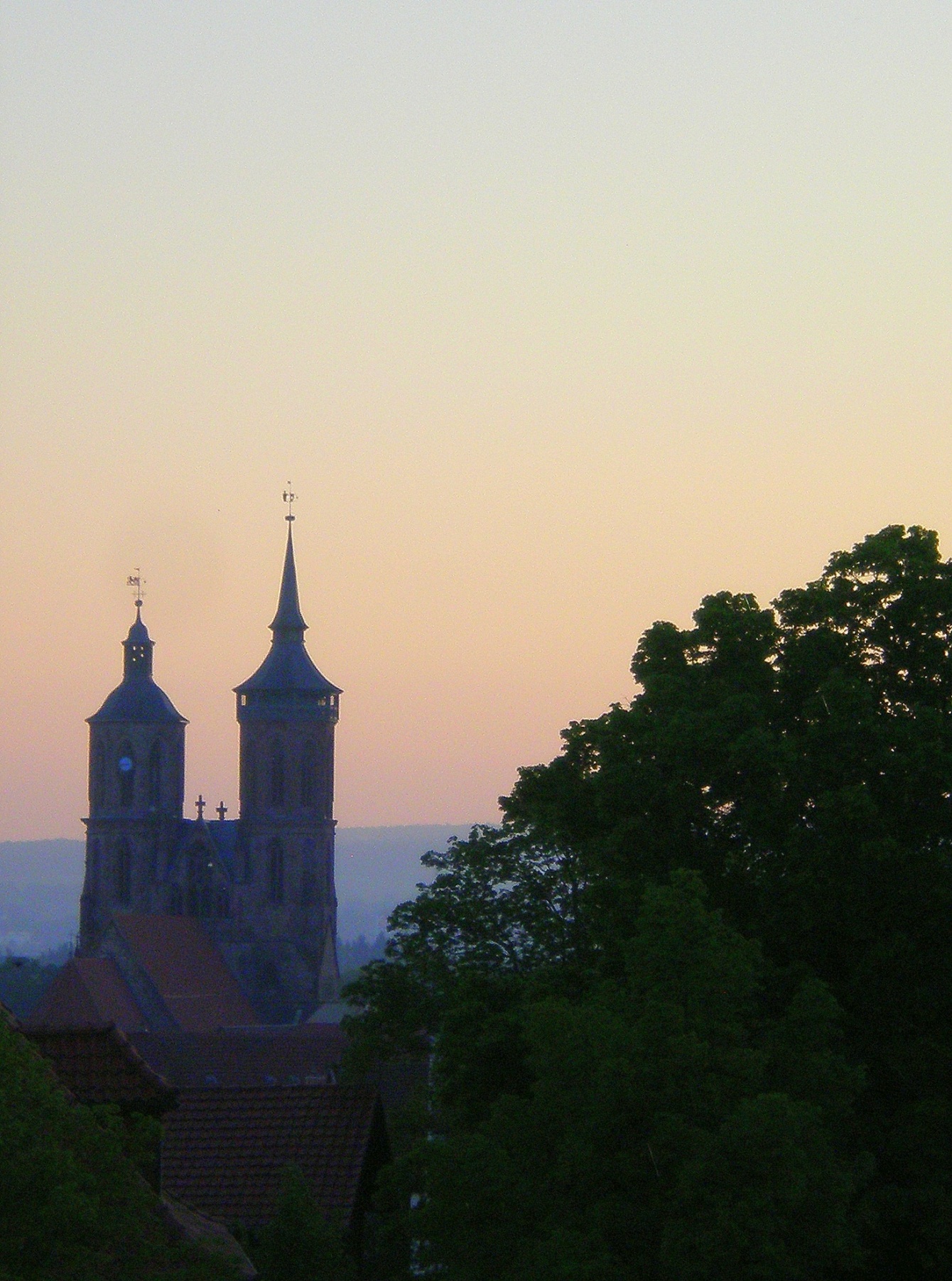 Alongside the concerts, then, the opera came over as a relative disappointment, though of course Cummings’ splendid baroque players kept it all rollicking along. And who could be curmudgeonly for a moment longer in a Göttingen summer evening, as I strolled back to the train station via the wonderful old houses by the Nikolaikirche (its towers pictured from the Stadthalle left) and the backstreets along the Leinekanal, heady with the scent of lilacs and loud with the blackbird song that’s to be heard in every street. Göttingen is no fossilized tourist town; the students keep it lively, and the Handel Festival gives it a gentle frisson of highest-quality delight. I can’t sum it up better than colleague Alexandra Coghlan, who on her visit last year wrote of its "quiet excellence and lack of pomp". Long may those qualities prevail.
Alongside the concerts, then, the opera came over as a relative disappointment, though of course Cummings’ splendid baroque players kept it all rollicking along. And who could be curmudgeonly for a moment longer in a Göttingen summer evening, as I strolled back to the train station via the wonderful old houses by the Nikolaikirche (its towers pictured from the Stadthalle left) and the backstreets along the Leinekanal, heady with the scent of lilacs and loud with the blackbird song that’s to be heard in every street. Göttingen is no fossilized tourist town; the students keep it lively, and the Handel Festival gives it a gentle frisson of highest-quality delight. I can’t sum it up better than colleague Alexandra Coghlan, who on her visit last year wrote of its "quiet excellence and lack of pomp". Long may those qualities prevail.
Share this article
The future of Arts Journalism
You can stop theartsdesk.com closing!
We urgently need financing to survive. Our fundraising drive has thus far raised £49,000 but we need to reach £100,000 or we will be forced to close. Please contribute here: https://gofund.me/c3f6033d
And if you can forward this information to anyone who might assist, we’d be grateful.

Subscribe to theartsdesk.com
Thank you for continuing to read our work on theartsdesk.com. For unlimited access to every article in its entirety, including our archive of more than 15,000 pieces, we're asking for £5 per month or £40 per year. We feel it's a very good deal, and hope you do too.
To take a subscription now simply click here.
And if you're looking for that extra gift for a friend or family member, why not treat them to a theartsdesk.com gift subscription?

Add comment